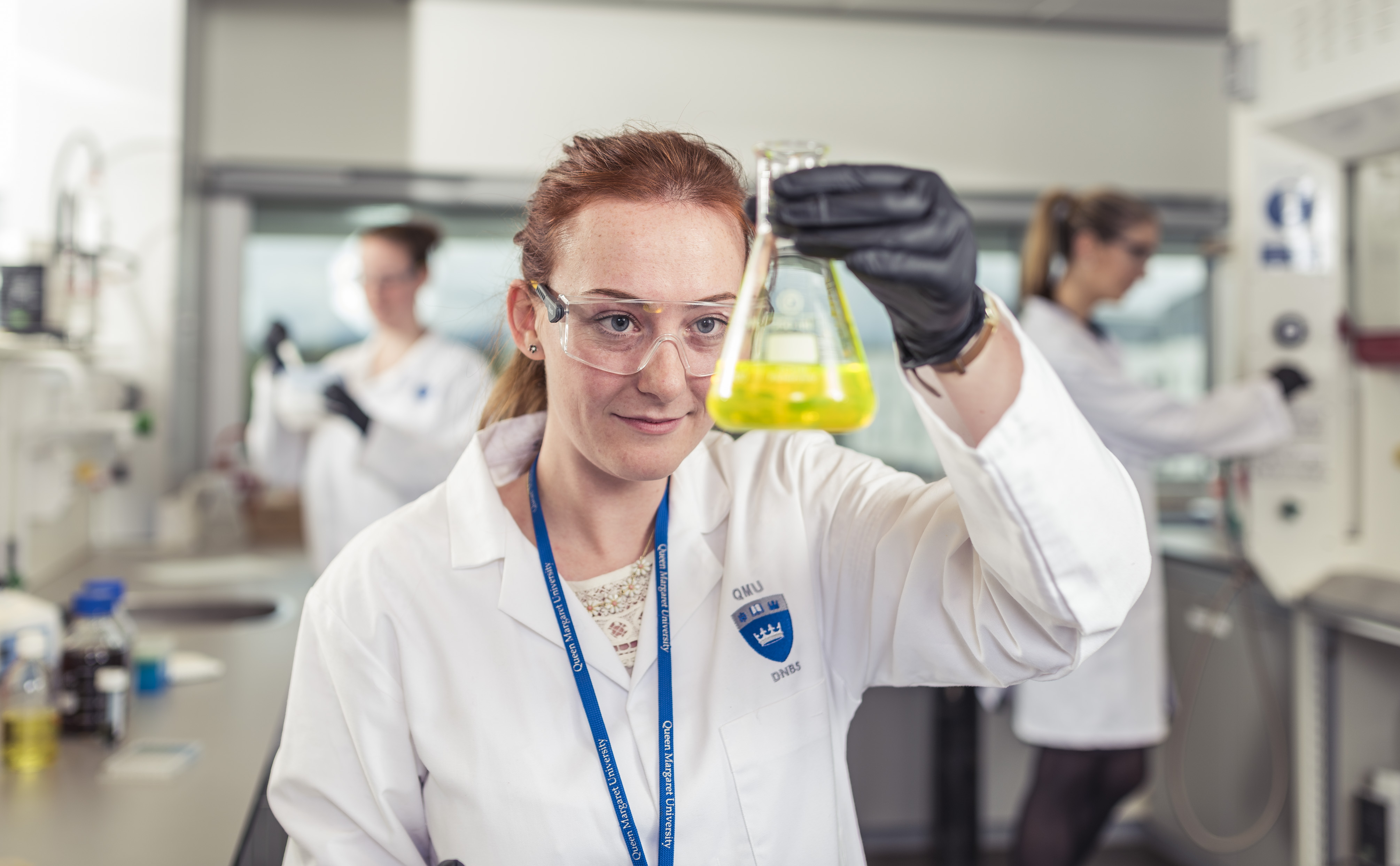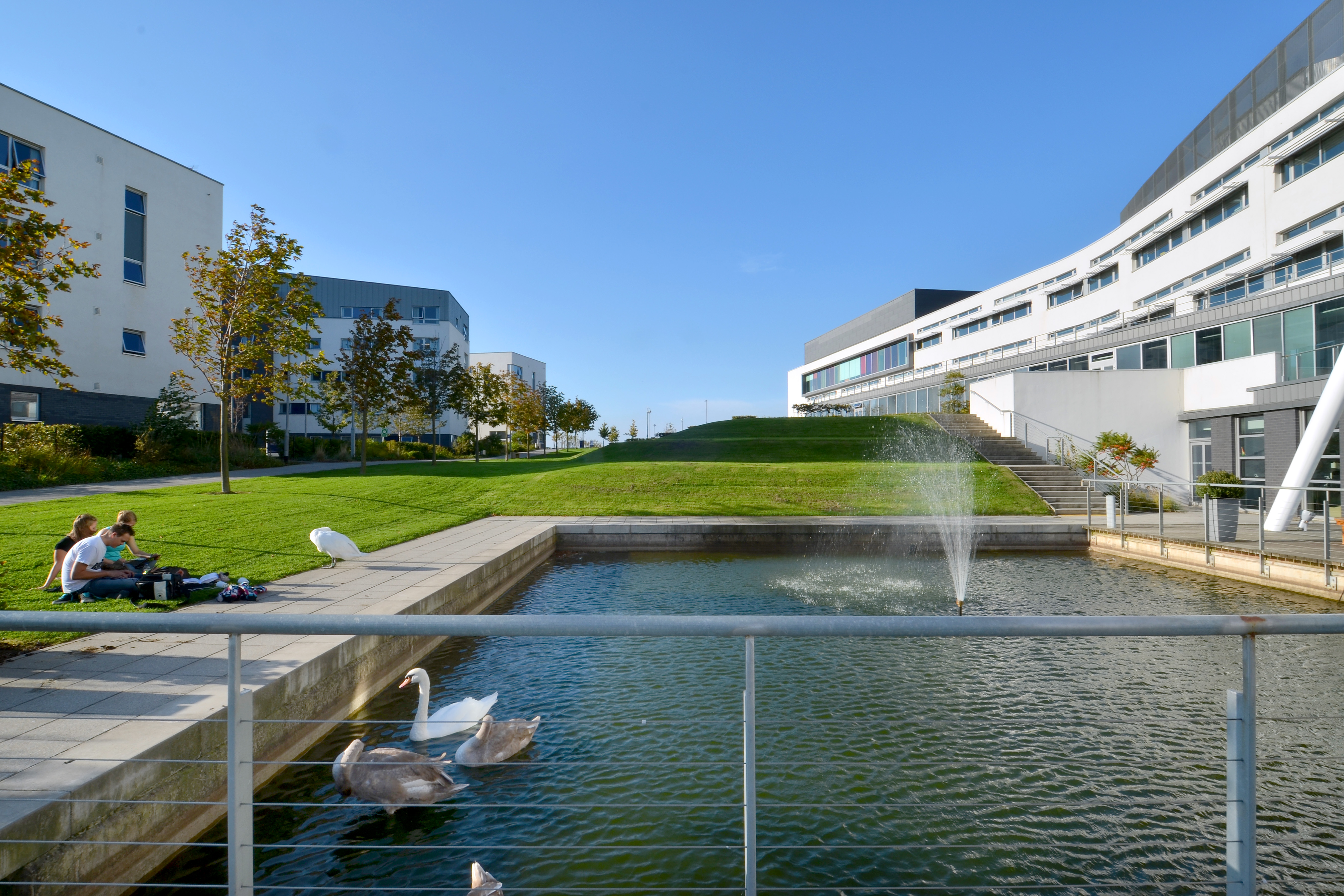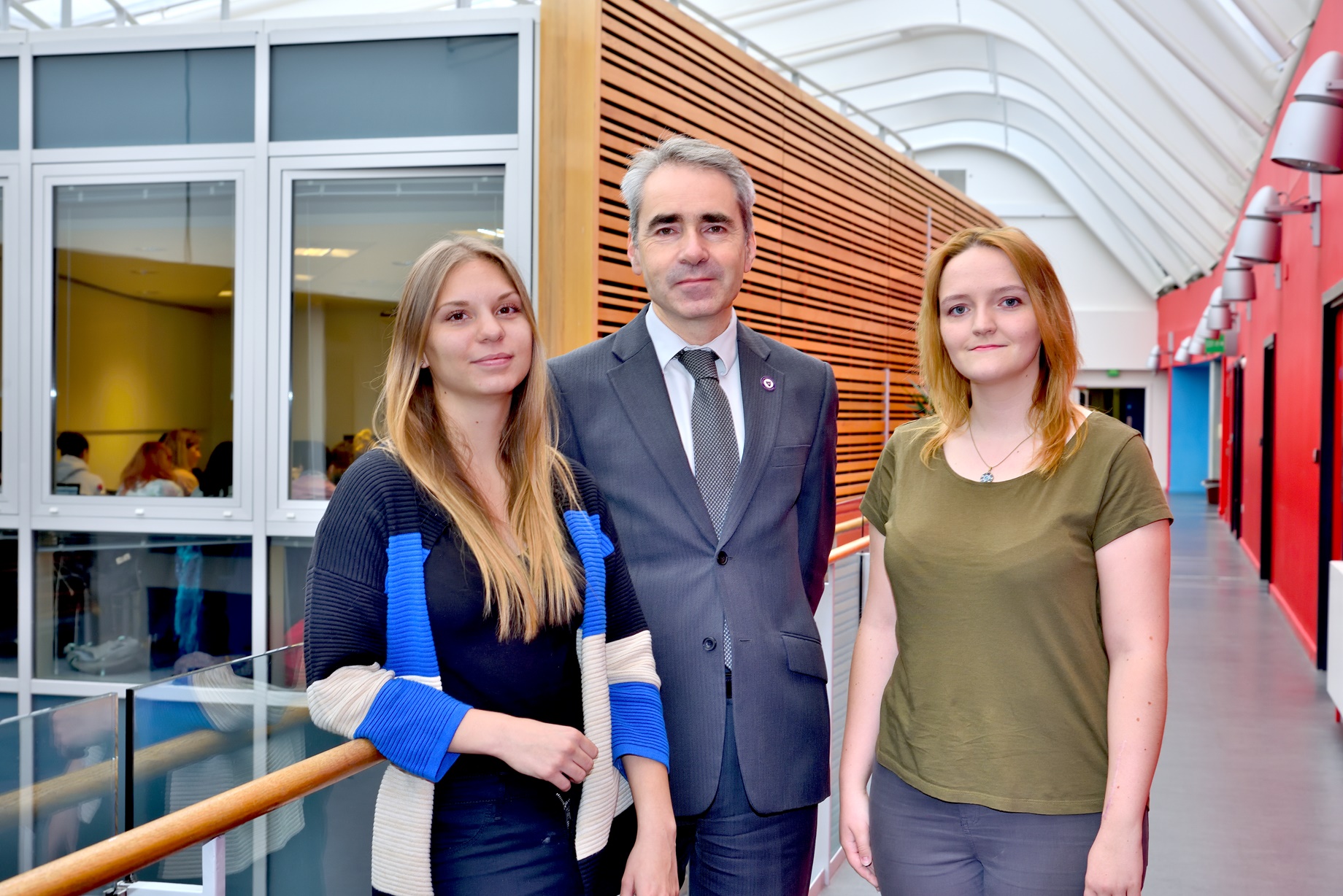 Queen Margaret University is developing a short online taster course for people interested in developing careers in dispute resolution and conflict management.
Queen Margaret University is developing a short online taster course for people interested in developing careers in dispute resolution and conflict management.
Conflict arises in many contexts – at work, at home, and in personal relationships. QMU will run a free online taster course which will provide an insight into how conflict can be resolved. It will cover topics such as ‘understanding conflict, ‘conflict escalation’ and ‘resolving conflict’.
QMU’s Consumer Dispute Resolution Centre has an established reputation as a centre of excellence for research and education in dispute resolution and consumer policy. The centre runs the MSc Dispute Resolution and the short online session is designed to give people a taste of the subjects covered in the Master’s programme, for example, looking at the reasons why conflicts can spiral out of control.
Carol Brennan, Director of QMU’s Consumer Dispute Resolution Centre, explained: “This taster session is ideally suited to individuals interested in the issue of conflict and how conflict situations can be resolved. Students who have studied the full MSc Dispute Resolution have gone on to pursue interesting careers in dispute resolution associated roles, with some graduates working as complaint handlers, arbitrators and mediators, and others holding positions within Ombudsman schemes.
“The master’s level course is also suitable for recent graduates who wish to develop their career in this increasingly important area of specialism, as well as those whose job already involves resolving areas of conflict, for example within human resource management.”
Carol confirmed: “We believe that the course will provide a helpful snapshot of the full MSc Dispute Resolution programme, allowing people to dip their toe into the water to see if the Master’s course may be a good fit for them. It also provides the opportunity for people to experience online learning and to become part of QMU’s growing online community of learners.”
Nial Vivian, Lecturer in Dispute Resolution at QMU, spent several years working for Ombudsman schemes and in other dispute resolution roles. He has studied the MSc Dispute Resolution, which led him to career opportunities in academia. He explained: “We know embarking on a full Master’s degree is a significant commitment and it’s helpful for people to be sure that they are investing their time and energy in something they really wish to pursue. The online taster course will help ensure people are better equipped to make an informed decision about studying at Master’s level, and to whet their appetite for study in the fascinating area of conflict resolution.”
Our short taster will run online for four weeks between Monday 19 February and Friday 16 March, and will involve participants in group discussions with students and lecturers, reading, viewing video presentations, and interviews with conflict resolution experts.
Find out more about the online taster course, and sign up, at https://goo.gl/GdXTqE
For further information on the MSc Dispute Resolution visit: https://goo.gl/EbFmoK
 Queen Margaret University has become the first higher education partner to join industry trade body Food and Drink Federation Scotland (FDFS).
Queen Margaret University has become the first higher education partner to join industry trade body Food and Drink Federation Scotland (FDFS).
Host to the Scottish Centre for Food Development and Innovation (SCFDI), QMU is a national leader in knowledge exchange linking food and health and the sustainability of the food chain, and in providing combined R&D and innovation space for the fast growing food sector.
The move represents a major step in realising the University’s ambitions as a centre of innovation and excellence in food development and will boost its work in improving crucial sector skills to ensure graduates are trained for the industry of the future. It also underlines QMU’s role in supporting the ambitions of the Food and Drink Industry Strategy Ambition 2030, which aims to grow the turnover of the industry to £30bn and identifies 3 pillars of growth – People and Skills, Supply Chain and Innovation.
In addition it will enhance the University’s ambition to support the UK and Scottish Governments’ policy priorities to address the challenges of tackling obesity and improving public health by working with industry to reformulate products and meet targets set for sugar and salt reduction.
Professor Tom Mercer, Director of the Scottish Centre for Food Development and Innovation at QMU said: “Our membership of Food and Drink Federation Scotland sends a clear signal to our industry partners that higher education has a pivotal role to play in driving innovation and growth in food manufacturing and new product development.
“Our research and education programmes along with our existing lab facilities and plans for an innovation park adjacent to the campus will form a national hub for sector developments in manufacturing, new product development and sustainability. We have a prime location that provides businesses access to national and international networks and expertise provided through QMU and the wider university network.”
FDFS Chief Executive David Thomson said: “On behalf of Food and Drink Federation Scotland I am delighted that Queen Margaret University has joined us as our first higher education professional affiliate. As the voice of food and drink manufacturing, we know the huge importance of higher education in our industry, delivering innovation and skills for a sector which has a real ambition to grow. This partnership will enhance the reputation of the industry as a career destination of choice as well as further raising awareness of the excellent facilities at Queen Margaret University.”
QMU’s proposals for an Innovation Park is the major project included within the Edinburgh City Region Deal to benefit East Lothian. Proposals centre around creation of two distinct areas on the land adjacent to QMU’s campus. As well as the park, a commercial hub will provide retail and leisure facilities for students, staff and the surrounding local communities.
 A new study from universities in Edinburgh has shown that travellers choose to sit on the right hand side of an aeroplane rather than the left.
A new study from universities in Edinburgh has shown that travellers choose to sit on the right hand side of an aeroplane rather than the left.
The study was led by Dr Stephen Darling, Psychology Lecturer at Queen Margaret University, Edinburgh and carried out at the University of Edinburgh. He explained: “It’s been known for a while that people have lateral tendencies in laboratory experiments – people preferring one side to the other – but we were keen to establish if individuals had right or left preferences which they applied to domestic tasks carried out in the real world.”
This research project was the first fully controlled study looking at where people would choose to sit on aeroplanes. Participants were asked to choose a seat by clicking on a seating plan diagram. They did this for 32 separate flights between fictional locations.
Sergio Della Sala, Professor of Human Cognitive Neuroscience at the University of Edinburgh, was part of the research team. He said: “We were keen to rule out the possibility that participants may have just had a tendency to click one side of the computer screen. Participants were therefore presented with seating diagrams with the plane facing either upwards or downwards. The result clearly showed that the orientation of the plane made no difference to the preference, with most participants still making an active choice to choose seating on the right of the plane.”
Dr Darling concluded: “The research shows that people’s preference as to which side they sit on in an aeroplane is dictated by our mind’s rightward bias in representing the real world.”
The research paper ‘Fly on the right: lateral preferences when choosing aircraft seats’ was published on 22 December 2017 in the journal ‘Laterality: Asymmetries of Body, Brain and Cognition.’ http://www.tandfonline.com/doi/abs/10.1080/1357650X.2017.1417994
Edinburgh’s Kitchin Group has teamed up with Queen Margaret University (QMU) for the first time to launch a new annual scholarship and help boost career prospects for students.
Kitchin Group’s Annual Award for Excellence will offer QMU’s international hospitality, tourism, events management or gastronomy students the chance to apply for the scholarship each year over the next three years to financially support their studies.
The partnership will also offer QMU’s budding restauranteurs and hospitality professionals the opportunity to gain valuable work experience and potential employment within Kitchin Group which includes Michelin star restaurant, The Kitchin – led by internationally acclaimed Scottish chef Tom Kitchin, award-winning Castle Terrace Restaurant – one of Edinburgh’s most elegant dining destinations and gastropub, The Scran & Scallie which was recently awarded a prestigious Bib Gourmand. All three businesses are considered by the university as ‘Best Practices Businesses’ in terms of service, food and drink both the city of Edinburgh and throughout the UK.
QMU has delivered elements of hospitality and tourism education for 140 years. Building upon more than a century of experience within the University and its predecessor institutions, the current hospitality and gastronomy lecturers at QMU consider themselves the custodians of the expertise passed down from the founders of the former Edinburgh School of Cookery. The University’s courses today are underpinned by some of the simple philosophies that were at the heart of the institution’s teaching over a century ago.
The University’s MSc Gastronomy is the latest innovation within Scottish postgraduate education. The MSc Gastronomy course has fired the imagination of the country’s top chefs, restaurateurs, legislators and those from a variety of food and drink related businesses.
QMU is also home to the Scottish Centre for Food Development and Innovation. Food scientists in this dedicated commercial facility are continuing to enhance Scotland’s position in the food innovation arena and support food and drink companies to develop and market healthier products.
Commenting on the new partnership between QMU and Kitchin Group, Professor Monika Foster, Head of Division of Business, Enterprise and Management at the University, said: “We’re extremely grateful to Kitchin Group for its investment in student learning that will help us identify, nurture and develop talented, willing and enthusiastic students to insure a professional supply of exceptional personnel for businesses such as Kitchin Group to inspire each guest with true and professional Scottish hospitality.
“The combination of talented students who have both solid work experience with a leading hospitality organisation, and excellent academic knowledge, will help to create future managers who can raise industry standards.”
Ron Kitchin, chairman of Kitchin Group, added: “As a business, we are passionate about fostering talent and supporting young people who are interested in a career in the industry. The Excellence Award will not only offer students financial and practical support with their studies but will give them an unparalleled insight into the world of a busy, successful and diverse hospitality business and the opportunity of hands on work-experience within Kitchin Group.”
The first QMU student to be awarded the Kitchin Group Annual Award for Excellence will be announced at the end of 2017.
 The world’s first ever Food & Drink Business Improvement Development (BID) group from East Lothian, Scotland’s Food & Drink County (SFDC), is delighted to announce Queen Margaret University (QMU) is to host the BID’s administrative functions within the Business Innovation Zone at its Musselburgh campus.
The world’s first ever Food & Drink Business Improvement Development (BID) group from East Lothian, Scotland’s Food & Drink County (SFDC), is delighted to announce Queen Margaret University (QMU) is to host the BID’s administrative functions within the Business Innovation Zone at its Musselburgh campus.
In a move that further extends Queen Margaret University’s (QMU) support of The East Lothian Food & Drink Business Improvement District (BID), the SFDC team look forward to working more closely with Queen Margaret University’s researchers and students, strengthening their existing relationship.
Backed by East Lothian Council, the BID, which is the first of its kind in the world, was established in 2016 to drive sector growth by sharing resources and providing economies of scale in marketing, sales and distribution to food and drink producers across the county. East Lothian is home to one of Scotland’s finest malt whisky distilleries, Glenkinchie, and also produces renowned gin, beer and cider companies. With over 40 miles of coastline, the county boasts a plentiful supply of freshly landed fish and seafood and has seen success in less traditional produce including spices, oils, ice-cream and chocolate.
QMU is home to the Scottish Centre for Food Development & Innovation and has been an associate member and an active supporter of the BID since its inception. Other member companies are already engaged with students on marketing projects and have taken advantage of University expertise in food and drink innovation, research, product development and market testing.
Commenting on the latest move, Miriam Smith of QMU’s Research & Knowledge Exchange Development Unit said: “QMU hosts the office of East Lothian Council’s Business Gateway which, together with the Business Innovation Zone at the University encourages entrepreneurship and provides a catalyst for regional innovation-led economic growth. We are delighted to welcome the BID team on site where they will rub shoulders with students, researchers and academics in their field, who in turn will benefit from deepening connections with local businesses. It’s a win win and we look forward to developing our partnership with them.”
QMU is a national leader in knowledge exchange that addresses the fundamental relationships between food and health and the sustainability of the food chain in order to further the production of healthy, functional foods.
Chair of the BID Louise Elder, founder of Black & Gold Rapeseed Oil, said: “We are delighted to be basing the BID’s administrative functions within the Business Innovation Zone at Queen Margaret’s Musselburgh campus. These are exciting times for East Lothian and Scotland’s Food & Drink County suppliers as we work more closely with Queen Margaret University’s researchers and students, strengthening our existing relationship. It is an invaluable opportunity which will allow us to maximise the group’s exposure to QMU’s food and health expertise.”
For further information about Scotland’s Food & Drink County, please contact info@scotlandsfooddrinkcounty.com
A new study has shown that an eight-week humanitarian intervention can improve the mental health and wellbeing of Syrian refugee and Jordanian youth in communities affected by the crisis in Syria.
About 5.2 million people have been forced to flee the six-year-old conflict in Syria, and over 650,000 Syrians are now rebuilding their lives in neighbouring Jordan.
The study brought together researchers from Yale University, the Institute for Global Health and Development at QMU in Edinburgh, Columbia University and the Hashemite University in Jordan. Published this month in the Journal of Child Psychology and Psychiatry, showed that a community-based programme for war-affected youth operating in Northern Jordan reduced the insecurity, distress, and mental-health difficulties of vulnerable boys and girls aged 12-18 years.
In a randomized controlled trial, the researchers learned that the programme most benefitted adolescents who had been exposed to four or more traumatic experiences.
“Community-based mental health interventions can help young people process the extreme stress of war and forced displacement,” said Catherine Panter-Brick, Professor of Anthropology, Health, and Global Affairs at Yale University and the study’s lead author. “Our findings will help humanitarian organisations develop robust, evidence-based programming to strengthen the mental health and protect the development of war-affected youth.”
The researchers worked in partnership with Mercy Corps, a global humanitarian organisation, which implemented the eight-week psychosocial program for refugee and host community youth evaluated in the study. The programme consisted of group-based activities and skills building intended to develop social cohesion and reduce the effects of profound stress.
The researchers also found that, over time, symptoms reduced in both treatment and control groups, but that with respect to feelings of insecurity, those engaged in the psycho-social intervention had sustained benefits relative to youth who did not, enhancing their recovery.
“It clearly makes sense to ensure that youth displaced from Syria are kept engaged in meaningful activities. But this study provides strong evidence that a short, structured programme can really make a difference to their sense of security and well-being as they face an uncertain future,” said Professor Alastair Ager, co-Investigator on the study and Director of the Institute for Global Health and Development at Queen Margaret University (QMU).
A student from Queen Margaret University (QMU), Edinburgh has launched his own theatre company after being awarded funding from the University.
Harry Jackson, 21, is now Artistic Director for Amplify Time Productions in Edinburgh, where he is in the final year of a BA (Hons) Acting for Stage and Screen degree at QMU.
A QMU Student Development Award has helped Harry get his project off the ground, as well as supporting 30 fellow students in a classical production at a major theatre venue in Edinburgh.
Amplify is the first independent theatre company to have been set up in the history of the BA (Hons) Acting for Stage and Screen course at QMU.
Amplify’s ethos is to provide students who are studying within creative industries with opportunities for personal development in a professional setting. This allows students to widen their personal skill sets, get company experience and have an opportunity to show what they can do and market themselves for future work outside of the University and into professional industry.
Commenting on his award and launching Amplify, Harry said: “I cannot put into words my gratitude and thanks to the alumni, friends and supporters of QMU whose donations have made this award possible. Support from QMU has given Amplify Time Productions the opportunity to shine and show off our creative skills and talent.
“QMU has a great reputation for giving quality, intensive actor training that allows you to develop your creative skills and academic knowledge. You also get the opportunity to take part in the Edinburgh International Film Festival and Fringe Festival with a show developed during your course.”
Harry’s company is now based within the Business Innovation Zone at QMU, where he benefits from access to small business start-up support and guidance from the campus-based Business Gateway, as well as QMU’s rehearsal facilities. Harry is now planning to take Amplify to perform in the Edinburgh Fringe Festival 2018.
Robin Wilson, Lecturer in Acting & Performance at QMU, said: “As a final year student on our Acting for Stage and Screen Programme, Harry is impressive. His boundless curiosity is only matched by his boundless energy. He is an organiser, an enthusiast and a leader. His natural charm enables him to galvanise his classmates and to focus them on ‘getting things done’. He is a pleasure to teach and a fully engaged creative asset to the course.
“For the first time on the Acting for Stage & Screen programme, a student has taken on the task of mounting a fully-fledged theatrical performance out-with the course. The fact that Harry has managed to gain the commitment, trust and enthusiasm of a large number of his fellow students is a tribute to his positive attitude and skills of leadership and communication.
“I’m very sure that everyone participating in the Amplify project will learn a tremendous amount of transferable skills. It is to be commended that Harry and his colleagues have had the initiative and stamina to undertake and sustain this project. I’m certain it will prove an asset to QMU and further enhance the reputation of the University for the high quality of its work.”
For more information on Amplify Time Productions, visit the company’s Facebook page www.facebook.com/AmplifyTheatre or Twitter: @AmplifyTheatre or Instagram: @amplifytheatre
For more information on BA (Hons) Acting for Stage and Screen at QMU, visit:
www.qmu.ac.uk/study-here/undergraduate-study/2018-undergraduate-courses-folder/baba-hons-acting-for-stage-and-screen
 A student from Queen Margaret University QMU), Edinburgh is a step closer to pursuing the career of her dreams after being awarded an £8,000 university grant by The Crerar Hotels Trust.
A student from Queen Margaret University QMU), Edinburgh is a step closer to pursuing the career of her dreams after being awarded an £8,000 university grant by The Crerar Hotels Trust.
Megan Gillis (Falconer), 18, has become the first person in her family to secure a place at university and begin her journey to becoming a professional wedding planner, thanks to the Crerar Hotels Hospitality Bursary.
Megan is now studying BA (Hons) International Hospitality & Tourism Management (IHTM) at QMU, where she is already getting the personal development, practical experience and skills needed to help achieve her career aspirations.
Megan did not think she could afford to go to university until she heard about the grant, which is helping fund her university studies at QMU over the next four years. She grew up in a single-parent family with a low household income, so she has first-hand experience of how restricted finances can be a struggle and limit personal development opportunities.
Despite undergraduate fees for Scottish students being covered by the Scottish Government, coming to university can be expensive, particularly if it involves moving away from home. Even when students have just enough money to live on, a lack of money can prevent them from participating in educational projects or exchanges that will enrich their education and make them more attractive to employers.
Money worries can also force students to focus too much on paid work at the expense of their studies. As well as affecting their grades negatively, this can lead to them dropping out of university altogether, or turning down their place of admission.
The Crerar Hotels Hospitality Bursary is available for prospective students like Megan, who are accepted onto the IHTM degree at QMU and who have the ability and potential to benefit from higher education, irrespective of their background or economic circumstances.
Uniquely, up to 50% of Crerar Hotels’ distributable profits are donated to charities operating within areas where Crerar Hotels are based. The Trust, which is chaired by Paddy Crerar, has awarded £7m of grants to over 400 organisations over the last 16 years. This forms part of a commitment to re-invest in the communities in which the group’s hotels and inns are based.
Paddy Crerar, Chairman of The Crerar Hotels Trust and Chief Executive of Crerar Hotels commented: “We’re delighted to have made this award to Queen Margaret University’s student, Megan Gillis, and look forward to hearing how this funding helps impact her university studies.
“Crerar Hotels is committed to giving back to the local community to help it grow and thrive, and provide opportunities that may otherwise seem out of reach. For every stay our customers have with us they are supporting others, who really need it. It is great for our folk in the hotels to see their hard work and efforts helping people in their own communities well as those from throughout the whole of Scotland and Yorkshire.”
Megan added: “I’m really grateful to The Crerar Hotels Trust and QMU for their support and for helping me secure my place at university.”
“I now feel able to achieve my full academic and career potential without the financial constraints. My hope is that this course will allow me to not only progress towards my career, but also gain valuable insight into how the hospitality industry works.”
 Two students from Hungary have become the first to study at QMU as part of a new scholarship exchange programme between Edinburgh and Budapest.
Two students from Hungary have become the first to study at QMU as part of a new scholarship exchange programme between Edinburgh and Budapest.
The Queen Margaret Legacy Programme has been developed by the Hungarian Embassy and Queen Margaret University (QMU), Edinburgh to celebrate the legacy of Saint Margaret, one of the most loved women from Scottish and Hungarian history.
Petra Kata and Anna Patziger, who are both students from Corvinus University of Budapest, are spending three months studying Public Relations and Media at QMU.
Petra and Anna will not only benefit from studying at QMU, but they will have the opportunity to immerse themselves in Scottish culture and life in Edinburgh, which will undoubtedly add to their overall learning experience.
The official partnership between QMU and the Hungarian Embassy was formed in recognition of the fact that QMU takes its name from Margaret, Queen Consort of King Malcolm Canmore of Scotland, who was born in Hungary in the 11th century.
She was known to be a fine scholar with a formidable intellectual capacity, who often debated the affairs of state with the King’s noble and clerical advisers. As a deeply religious woman, Queen Margaret was concerned with works of mercy and giving and particularly with the care of the poor. As a result, she was canonised as saint in 1250.
The name Queen Margaret was incorporated into QMU’s title in 1972 because she was seen to personify the institution’s key values of serving the community, enhancing the quality of life, and taking practical action. Queen Margaret’s philosophy of social justice and her ability to identify what changes were required in society still resonates today and her name is reflected in the titles of a number of organisations with social purposes, including QMU.
Dr Richard Butt, Deputy Principal of QMU, said: “We’re delighted welcome Petra and Anna to QMU and wish them well as they embark on this exciting study opportunity through the Queen Margaret Legacy Programme.
“This educational exchange programme, and the transcultural learning it is now enabling, are entirely consistent with the life and values of Queen Margaret herself. Not only is this partnership creating a culturally rich and career enhancing learning experience for students, it is also creating a further link between Scotland and Hungary.”
Commenting on the opportunities that the Queen Margaret Legacy Programme is providing her with, Anna said: “The opportunity to live and study in Edinburgh really appealed to me. The history, culture and diversity of the city, combined with the stunning natural beauty, makes it an ideal environment to learn and broaden your horizons.
“I’m already building my practical knowledge of public relations and media, which will definitely help my CV stand out in the crowd.”
Petra added: “I’ve found everyone so welcoming and friendly since moving to Edinburgh and studying at QMU, which has helped me feel at home. The friendly size of Edinburgh makes it easy to explore, including Arthur’s Seat with its amazing views of the city.
“My hope is that studying public relations and media at QMU will give me the knowledge and experience I need to pursue a career in this sector back in my home city of Budapest.”
The exchange programme also allows QMU students to study in Hungary and experience life in Budapest. Earlier this year, QMU public sociology students, Caitlin McDowell and Ellen Rahm, spent three months studying at Corvinus University of Budapest and living in the city.
For more information on the Queen Margaret Legacy Programme, E: development@qmu.ac.uk
 The new signing for Edinburgh Capitals, Mike Cazzola, has not only joined Edinburgh’s ice hockey team, he’s committed to a two year physiotherapy programme at Queen Margaret University.
The new signing for Edinburgh Capitals, Mike Cazzola, has not only joined Edinburgh’s ice hockey team, he’s committed to a two year physiotherapy programme at Queen Margaret University.
Mike, who is originally from Guelph in Ontario, was recruited by the Capitals having had a hugely successful rookie season in the East Coast Hockey League in the United States/North America. He was a top point scorer for his club The Fort Wayne Komets, and also the top point scoring rookie in the ECHL.
Edinburgh Capitals has welcomed the ECHL All Rookie All Star with open arms and has high hopes for his future contribution to the team and for his impact on the sport in Scotland.
Before coming to Scotland at the end of August this year, Mike had spent four years studying at Acadia University. During his time at the University, where he studied a degree in Kinesiology, he continued to post impressive numbers scoring 133 points in just 107 games for his University. Over his four seasons attending the University, he was never out of the top two in scoring and was top scorer twice.
Part of the appeal of coming to Scotland was the chance to enrol with Queen Margaret University on its two year MSc Physiotherapy (pre-registration) course. The School of Health Sciences at QMU provides the largest range of professional healthcare courses in Scotland.
Mike has always liked to challenge himself – academically and physically – so he is delighted to be combining his hockey playing skills with the chance to study at postgraduate level.
He explained: “Combining my passion for ice hockey with the chance to study physiotherapy at QMU is a once in a lifetime opportunity. Scotland is renowned throughout the world for the quality of its higher education and I feel privileged to have the chance to experience and benefit from the country’s education system. I am now in the process of meeting the physiotherapy lecturers and am enjoying getting to know students from Scotland, the rest of the UK as well as international learners. I am really looking forward to becoming part of the QMU community, discovering the beautiful city of Edinburgh and the East Lothian coast, and contributing to the development of the Edinburgh Capitals.”
Professor Fiona Coutts, Dean of the School of Health Sciences at QMU, said: “We aim to create educational courses at the leading edge of today’s issues, with graduates who are in demand, work-ready, able to progress in their chosen profession, and who can challenge current healthcare practices. Importantly, this course produces postgraduate physiotherapists who are skilled, independent and critical thinkers, analytical and capable of evaluative judgement, and who can contribute to the health and wellbeing of the individual and of society.”
By studying physiotherapy at QMU, Mike will benefit from a well-equipped School with specialised teaching facilities and state-of-the-art laboratories where practical skills can be honed before clinical placement. QMU also has a range of research laboratories, and a suite for the measurement of human movement using three-dimensional motion analysis, human performance and neuromuscular analysis.
Professor Coutts confirmed: “We are sure that with Mike’s understanding of physical activity, coupled with his existing academic knowledge in Kinesiology, that he is well equipped to take on the challenges of the our MSc Physiotherapy pre-registration programme.”
Professor Coutts concluded: “Mike is going to be kept extremely busy during his two year scholarship with QMU which will involve juggling intensive course work and 1000 hours of placement with his sports commitments. However, as a successful athlete I’m sure he will relish the challenge. We look forward to helping him settle into the QMU community, supporting him on his learner journey and encouraging him to achieve his academic goals!”





